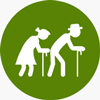 Background, initiator and participants
Background, initiator and participants
An Awareness Week is organised in Cyprus on an annual basis. In 2018, the theme was the Bioethical Dimensions of Ageing, the launch of which was accompanied by a press conference, under the auspices of the President of the Republic of Cyprus, the Cyprus Minister of Health, and the Cyprus Minister of Labour and Social Welfare.
Objective: The objective of the Awareness week is twofold:
- (i) to inform the public about bioethical developments
- (ii) to inform policymakers of the challenges and the need for governance arrangements raised by public debate.
 Method
Method
The Awareness week in 2018 comprised a wide range of events, including the following:
- Photo exhibition on old age,
- a round table discussion with the President of the House of Representatives and Members of the Parliamentary Committees on: i) Human Rights, ii) Health Affairs, and iii) Legal Affairs,
- a round table discussion with the Commissioner for Personal Data Protection and the Commissioner for Administration and Human Rights (Ombudsman),
- a seminar on the topic of Social Inclusion and Vulnerability,
- a round table discussion on death and bereavement,
- a workshop on “Making Decisions in Ethical Dilemma Situations End of Life”,
- a workshop on the “Ethics and Medical Ethics in everyday Medical Practice to elderly people”,
- a Code of Journalistic Ethics – A Code of Conduct for Journalists and the Mass Media regarding elderly people,
- a workshop on “Ethics and Ethical Issues in Dental Practice for elderly people”,
- a seminar on “Ethics and Deontology in Pharmacy regarding elderly people",
- a seminar on “Therapeutic options for coping with dependence in Cyprus”,
- lectures targeting medical students on: Ethical Obligations in Medicine Learning from the Past and Preparing for the Future; What is changing in the Ethics of Resuscitation? The bioethics of new surgical techniques,
- a workshop entitled “Deontology and Ethics in Educational Research: The Case of Student Participants”,
- debates between medical students on: (i) The moral, political and social implications of end of life issues, (ii) The medicolegal aspects of elderly sexual abuse,
- a conference on “Intergenerational Programs: Keeping Seniors Young, Making Youth Wiser”.
A public round table discussion on Raising Awareness on Ageing & Elderly People was organised by The Cyprus National Bioethics Committee (CNBC). The participants were experts, policymakers and relevant stakeholders who included the Cyprus Elders Parliament and the Cyprus Elderly People Observatory (NGO). The audience was the general public. There were two overarching questions: (i) What is the level of care in nursing homes and the quality of the checks carried out by the Social Welfare Department (Cyprus Ministry of Labour, Welfare & Social Insurance)? (ii) What are the living conditions in nursing homes in Cyprus (both public and private)? The debate, which involved the public audience, revealed the following problems in nursing homes for elderly people:
- No regular checks were carried out at night by the staff, often due to staff shortages.
- shortage of certified carers in the nursing homes,
- need for more effective and adequate protection of the elderly from any form of abuse and maltreatment,
- inspections ought to be carried out by competent authorities,
- need for better handling of complaints from residents.
The round table concluded that a change of policy was necessary. Instructions were immediately given to amend existing legislation regarding the quality of nursing care in Cyprus (both public and private nursing homes for the elderly).
 Notable features and lessons learned
Notable features and lessons learned
Public debate can be very valuable as a tool for informing the public of policy-making challenges and decisions to be taken. The variation of methods served to involve as many subjects as possible in the process. The activities targeted a wide range of beneficiaries (the public at large, high school students, senior citizens, medical university students, research community, health professionals) which were very well received and garnered broad coverage on TV, print and electronic media.
A key factor was the openness of the debate which allowed for views to be shared freely by individuals who were well informed about the challenges at hand whilst having representatives of the policy-makers present. The conclusions prompted the government to review the legislation concerning elderly people. In particular, the debate on elderly care had a direct impact on governance. A Ministerial mandate was given to the CNBC to undertake an investigation into state and private nursing home establishments with a view to reviewing existing legislation, for example in order to ensure appropriate staffing around the clock. This legislation is being amended and will be presented to the House of Parliament for ratification.
An obvious downside of a large-scale public debate is that it limits the topic to one per year. On the other hand, it creates an opportunity for a deeper understanding of the challenges at hand.



